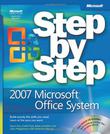2007 Microsoft Office System 进阶指南
2007-2
Microsoft Press
Online Training Solutions Inc.,Curtis D. Frye,Joan Preppernau,Joyce K. Cox,Steve Lambert
641
Work at your own pace through the easy numbered steps, practice files on CD, helpful hints, and troubleshooting help to master the fundamentals of working with Office 2007, including how to navigate the new user interface. With coverage of core Office programs, and highlights of new programs, you will learn how to create professional-quality documents, powerful spreadsheets, and compelling slide presentations. You will also discover how to get your Web site up and running, how to take notes electronically, and how to manage your e-mail communications and workday. Youll even step through the fundamentals of working with Microsoft InfoPath forms and collaborating with Microsoft Office SharePoint, Microsoft Office LiveMeeting, and Microsoft Office Groove.
Curtis Frye is the author of numerous books on Excel and other Office products, most recently the "Excel 2007 Pocket Guide." He graduated from Syracuse in 1990 with a degree in political science, and then moved to Washington, DC, where he worked as a defense trade analyst for four years and as the director of sales and marketing for an ISP for one year. He moved to Portland, Oregon, in 1995 to launch his freelance writing career. When Curt's not writing, and often while he is writing, he is a keynote speaker, mentalist, and professional improvisational comedian.Joyce Cox has more than 30 years' experience in the development of training materials about technical subjects for non-technical audiences and is the author of dozens of books about Office and Windows technologies. Joyce is vice president of Online Training Solutions, Inc. (OTSI). Previously, she was president of and principal author for Online Press, where she developed the Quick Course series of computer training books for beginning and intermediate adult learners. She was also the first managing editor of Microsoft Press, an editor for Sybex, and an editor for the University of California.Katherine Murray has written more than 60 computer books, including Microsoft Office 2010 Plain & Simple, Microsoft Word 2010 Plain & Simple, and Microsoft Word 2010 Inside Out. She specializes in teaching people and businesses how to improve their productivity using Microsoft technologies, and she loves the freedom that comes along with the "work virtually anywhere" approach Office 365 offers.
Part Ⅰ Microsoft Office Word 2007 1 Exploring Word 2007 Working in the Word Environment Opening, Moving Around in, and Closing a Document Displaying Different Views of a Document Creating and Saving a Document Previewing and Printing a Document Key Points 2 Editing and Proofreading Documents Making Changes to a Document Inserting Saved Text Finding the Most Appropriate Word Reorganizing a Document Outline Finding and Replacing Text Correcting Spelling and Grammatical Errors Finalizing a Document Key Points 3 Changing the Look of Text Quickly Formatting Text and Paragraphs Manually Changing the Look of Characters Manually Changing the Look of Paragraphs Creating and Modifying Lists Key Points 4 Presenting Information in Columns and Tables Presenting Information in Columns Creating a Tabular List Presenting Information in a Table Formatting Table Information Performing Calculations in a Table Using a Table to Control Page Layout Key PointsPart Ⅱ Microsoft Office Excel 2007 5 Setting Up a Wordbook Creating Workbooks Modifying Workbooks Modifying Worksheets Customizing the Excel 2007 Program Window Zooming In on a Worksheet Arranging Multiple Workbook Windows Adding Buttons to the Quick Access Toolbar Key Points 6 Working with Data and Data Tables Entering and Revising Data Moving Data Within a Workbook Finding and Replacing Data Correcting and Expanding Upon Worksheet Data Defining a Table Key Points 7 Performing Calculations on Data Naming Groups of Data Creating Formulas to Calculate Values Summarizing Data That Meets Specific Conditions Finding and Correcting Errors in Calculations Key Points 8 Changing Document Appearance Formatting Cells Defining Styles Applying Workbook Themes and Table Styles Making Numbers Easier to Read Changing the Appearance of Data Based on Its Value Adding Images to a Document Key PointsPart Ⅲ Microsoft Office Access 2007Part Ⅳ Microsoft Office PowerPoint 2007Part Ⅴ Microsoft Office Outlook 2007GlossaryIndex

2007 Microsoft Office System 进阶指南 PDF格式下载